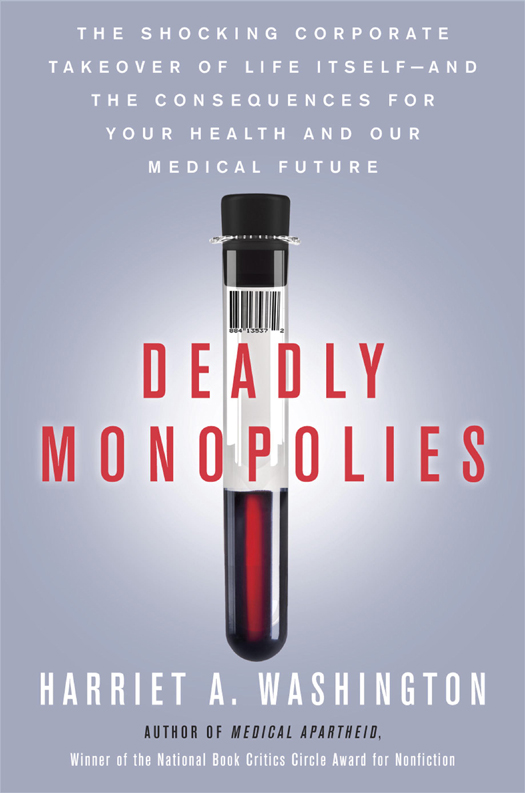
Deadly Monopolies
The Shocking Corporate Takeover of Life Itself—And the Consequences for Your Health and Our Medical Future.
کتاب های مرتبط
- اطلاعات
- نقد و بررسی
- دیدگاه کاربران
نقد و بررسی

October 3, 2011
Medical ethicist and journalist Washington, winner of the 2008 NBCC Award for Nonfiction for Medical Apartheid, spotlights the choices made within Big Pharma, and finds that they all point to one motive: profit. Washington begins with the 1980 Bayh-Dole Act, which "married the university to Big Pharma created a medical-industrial complex that eventually robbed universities of their independence and seized control of medication design, costs, and even the evaluation of medication in medical journals." The industry generated record profits through such tactics as selling excised tissues without permission, patenting human genes that were found to be linked to diseases, and even conducting research on uninformed trauma victims and suspicious drug trials in third world countries. The $310 billion industry, which takes in huge profits while bankrupting first world patients and ignoring many third world diseases, often justifies its actions by claiming high research costs, but Washington finds many holes in this argument. This eye-opening investigation will make it clear why "erection on demand seems a higher priority than surviving malaria and tuberculosis." Washington concludes with suggested solutions for this ethical morass: open-access drug development, legislation, and collaborations motivated first by research, not profit.

Starred review from September 1, 2011
A searing look at the medical-industrial complex and its ability to patent genes and other biological products, resulting in an opportunistic and powerful pharmaceutical industry that often ignores the most pressing global-health issues in order to make a profit.
National Book Critics Circle Award winner Washington (Medical Apartheid: The Dark History of Medical Experimentation on Black Americans from Colonial Times to the Present, 2007, etc.) begins with the controversial 1980 Bayh-Dole Act, which allowed the commercialization of medical inventions based on government-funded patents, including those on living things. As a result, an unprecedented collusion between universities, researchers and private pharmaceutical and biotechnology companies spawned an era in which many vital medicines are too expensive or inaccessible to average consumers, or rushed to market before being adequately tested. Despite the fact that taxpayers largely fund medical research and development, pharma companies include that cost in their purported expenses, therefore using disingenuous figures to justify the skyrocketing costs of patented drugs. The author adeptly details the wide-ranging repercussions of this monopolistic research model and recounts chilling anecdotes that reveal a pattern of shady practices by biotech and pharma companies. These firms often display a lack of respect for patients' rights in a ruthless pursuit of "blockbuster" drugs without regard for helping those who need it most. As of 2009, only 10 percent of the more than $70 billion spent per year on medical research addresses "diseases that cause 90 percent of the world's health burden." In addition, minorities and poor populations are often exploited for their genetic material yet not compensated for their contribution. Thousands of people die from preventable causes simply because it's not profitable to save them. The author clearly presents data to elucidate these complex issues, and cogently argues that there are opportunities to reinstate transparency, collaboration and altruism in drug development and disbursement.
A gripping, revelatory account.
(COPYRIGHT (2011) KIRKUS REVIEWS/NIELSEN BUSINESS MEDIA, INC. ALL RIGHTS RESERVED.)

Starred review from October 1, 2011
In 2004, Marcia Angell called for major reform in the pharmaceutical industry in her groundbreaking book, The Truth About the Drug Companies. Now, National Book Critics Circle Award winner Washington (Medical Apartheid) illustrates that, in many ways, the issues surrounding drug research are only getting worse. She contends many of the problems relate to the Bayh-Dole Act, the U.S. patent system, and researchers' ability to patent not only genes but also other life forms. Regulatory changes in the way the drug industry and universities collaborate have led to stronger financial incentives, significant conflicts of interest, and an emphasis on creating profitable drugs at the expense of vital new medical research. Perhaps most frightening are the examples of how Henrietta Lacks's story is not unique--other Americans have had cells or organs confiscated for research without permission and without seeing a direct benefit. These research abuses are not limited to the United States and are also perpetrated in developing countries. VERDICT Extensively documented with minimal scientific jargon, this book is recommended for any reader interested in the future of our health system. [See Prepub Alert, 8/4/11.]--Tina Neville, Univ. of South Florida at St. Petersburg Lib.
Copyright 2011 Library Journal, LLC Used with permission.

September 1, 2011
Washington, author and scholar, explains the consequences of a 1980 Supreme Court decision and congressional legislation: Now universities sell and license patents developed with taxpayer dollars to privately held firms, including biotechnology and pharmaceutical companies, which underwrite the cost of drug research and development. Efforts are driven by profits. Although acknowledging that medical research has extended and transformed lives, the author describes the astonishing negative aspects of this corporate-university partnership, which she calls the medical-industrial complex. Her exhaustive review of the state of medical research examines everything from the testing of patients without informed consent to the shadowy appropriation and marketing of Americans' tissues to the biocolonialism that governs the appropriation of everything from seeds and plants to genes from poor people in the developing world. Given the author's blistering attack on today's medical research, the following is noteworthy, Washington Post (7/23/11): The federal government has proposed sweeping revisions to rules governing scientific research . . . covering nearly all human-subject research financed by the American taxpayer. An eye-opening book.(Reprinted with permission of Booklist, copyright 2011, American Library Association.)

























دیدگاه کاربران